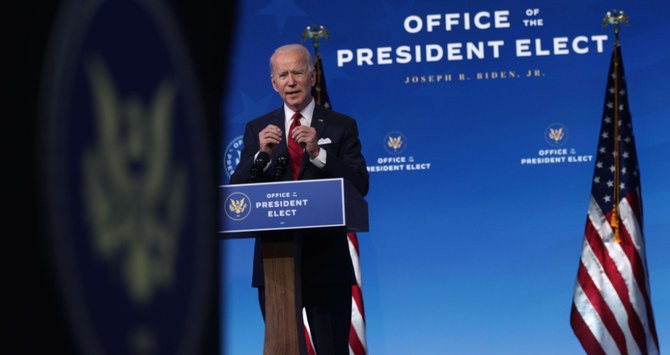
- ARAB NEWS
- 26 Apr 2024

LONDON: Global shares stumbled on Friday as hopes of a fiscal boost from a $1.9 trillion US stimulus plan were smothered by the prospect of stricter lockdowns in France and Germany and a resurgence of COVID-19 cases in China.
European stocks followed Asian markets lower, with the pan-European STOXX 600 down 0.8 percent and London’s FTSE 100 0.8 percent weaker, with the latter clobbered by data showing Britain’s economy shrank in November for the first time since the initial COVID-19 lockdown last spring.
The MSCI world equity index, which tracks shares in 49 countries, was 0.3 percent lower. S&P 500 e-mini futures shed 0.3 percent to 3,779.
Oil prices, which had risen on a weak dollar and strong Chinese import data, dropped as COVID-19 concerns in China hit sentiment.
Brent was down $1.33, or 2.3 percent, after gaining 0.6 percent on Thursday. US West Texas Intermediate crude was down $1.17, or 2.1 percent at $52.44 a barrel, having risen more than 1 percent the previous session.
Brent and US crude were heading for their first weekly declines in three weeks.
Spot gold rose 0.1 percent to $1,847.00 per ounce.
While oil producers are facing unparalleled challenges balancing supply and demand equations with calculus involving vaccine rollouts versus lockdowns, financial contracts have been boosted by strong equities and a weaker dollar, which makes crude cheaper, along with strong Chinese demand.
“The recent resurgence in coronavirus infections, appearance of new variants, delayed vaccine rollouts and renewed lockdown measures in most major OECD economies has clouded the economic and demand recovery,” said Stephen Brennock of oil broker PVM.
“Simply put, near-term demand expectations aren’t too promising.”
Earlier on Friday, an Asian regional share index had edged near record highs after US President-elect Joe Biden proposed a $1.9 trillion stimulus plan to jump-start the world’s largest economy and accelerate its response to the coronavirus.
In prime time remarks on Thursday, Biden outlined a proposal that includes $415 billion aimed at the COVID-19 response, some $1 trillion in direct relief to households, and roughly $440 billion for small businesses and communities hard hit by the pandemic.
But that initial boost later faded as risk appetite waned, lifting bond prices and the dollar, and hitting equities.
“People are saying it’s a big number but markets are almost acting like its a disappointment,” said James Athey, investment director at Aberdeen Standard Investments.
“I think maybe the market was pricing an additional $2,000 cheque going to the US population, but what’s being proposed is a top-up of $1,400 to take the total to $2,000 because $600 has already been agreed.”
Investors also digested the prospect of rising taxes to pay for the plan.
“The concern is what it’s going to mean from a tax stand point,” said Tim Ghriskey, chief investment strategist at Inverness Counsel in New York.
“Spending is easy to do but the question is how are you going to pay for it? Markets often ignore politics but they don’t often ignore taxes.”
Biden’s comments came after US Federal Reserve Chair Jerome Powell struck a dovish tone in comments at a virtual symposium with Princeton University.
Powell said the US central bank is not raising interest rates anytime soon and rejected suggestions the Fed might start reducing its bond purchases in the near term.
Investor concerns over the prospects for a global economic recovery were raised after France strengthened its border controls and brought forward its night curfew by two hours to 6 p.m. for at least two weeks to try to slow the spread of infections.
German Chancellor Angela Merkel called for “very fast action” to counter the spread of variants of the coronavirus.
Chinese blue chips eased 0.2 percent, snapping a four-week winning streak, after the country on Friday reported the highest number of new COVID-19 cases in more than 10 months.
US earnings season kicked into full swing with results from JPMorgan, Citigroup and Wells Fargo.
JPMorgan Chase reported a much better-than-expected 42 percent jump in fourth-quarter profit on Friday, driven by the release of some of the reserves it had built up against coronavirus-driven loan losses.
Investors will be looking to see if banks are starting to take down credit reserves, resume buybacks, and provide guidance that shows the economy is improving, said Thomas Hayes, chairman of Great Hill Capital in New York.
In the currency market, the US dollar rose.
The dollar index was at 90.407 versus a basket of currencies, up 0.2 percent on the day.
It was on track for a weekly gain of around 0.4 percent, making this its strongest week since November.
Against the stronger dollar, the euro was down 0.2 percent at $1.21325.
US yields stepped back as risk appetite waned. Benchmark 10-year Treasury notes yielded 1.1039 percent, down from a US close of 1.129 percent on Thursday, while the 30-year yield dipped to 1.8451 percent from 1.874 percent.
In Europe, Italy’s bond market was poised to end the week calmer, as 10-year bond yields were down 2 basis points at 0.59 percent.
Italian Prime Minister Giuseppe Conte resisted calls to resign on Thursday after a junior coalition party led by former premier Matteo Renzi pulled out of the government on Wednesday and stripped it of its majority.
Reuters